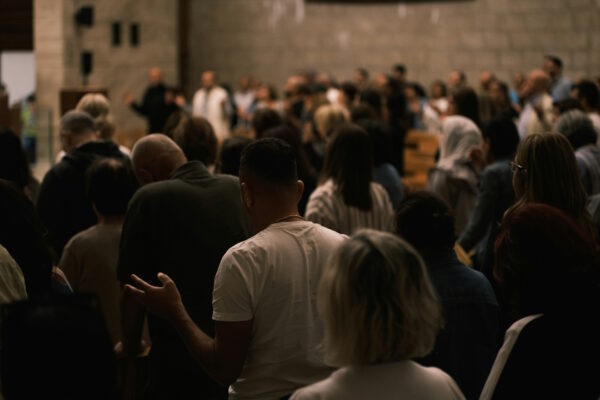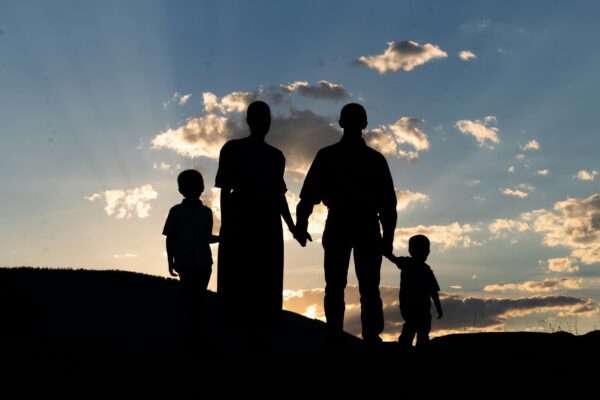This sermon on depression and the church community from Acts 20:1-12 was delivered by pastor Matt Bedzyk at a seminar on depression at Calvary Baptist Church, March 27th, 2021.
When suffering comes our way, many often turn to religion or spirituality for quick relief. In our desperation, we will believe or do anything if it will ease our struggles. We want an instant remedy for the pain. But there are no such instant guarantees when it comes to the Christian faith.
Now, while it is certainly true that our God is able to miraculously heal and to deliver, that he has conquered death through the resurrection of Jesus Christ, and that one glorious day he will make all things new, trusting in him for salvation is not the answer for a pain-free life. Rather, the Bible teaches that we have been saved in hope. Paul writes in Romans 8 that, for those who belong to Christ, we “groan inwardly as we wait eagerly for . . . the redemption of our bodies” (Rom. 8:23-24). Until that day when faith turns to sight, we often cry out: “How long, O Lord?”
So, as we hope in God and believe the gospel of his beloved Son, we still suffer, but we don’t merely suffer. Our God has promised to graciously supply us with all we need to suffer well.
For those who suffer with depression, this is what I want to ask: how can we suffer well? The most important question you can ask is not “How can I get rid of my depression?” but first, “How can I be saved, forgiven of my sin and justified?”; and then second, “How can I continue to trust my Savior Jesus while struggling with depression? How do I rely on God’s abundant grace to suffer well?”
There are several ways to do this. The two most basic means of grace are the word and prayer. Our God has promised to strengthen us as we encounter him in his word and in prayer. But there’s another means of grace that is essential if we are to struggle well, and that is community. We must be in the word and prayer with others. Believers must be devoted to the fellowship of a local church community, for this is vital for our encouragement in the faith.
You see, the devil is always looking for someone to deceive, to discourage, and to devour; for someone to lose sight of the glory of Christ. And both anxiety and depression can all too easily become an occasion to doubt God, to reject his gospel, and to fall away from promised grace. Thus, believers must be encouraged if we are to suffer well and hold fast the confession of our hope. To be strong in the Lord, to stand firm in the faith, we need to put on the whole armor of God and pray always. But we don’t stand alone; in Christ, we stand arm in arm with others.
Today, as we continue to look at what the Bible has to say about depression, I want us to look at a rather unusual story found in the book of Acts, chapter 20. In this passage, the author (Luke) provides us with a seemingly unimportant travel summary and an often-misunderstood miracle. But here, we will see that we encounter the God of all comfort in gospel community. It is in the fellowship of a local church that we find the strength we need to suffer well.
The Ministry of Encouragement (Acts 20:1-6)
In the first three verses of Acts 20, we get an incredibly brief summary of Paul’s travels after a riot that took place at Ephesus. He travels around the Aegean Sea through Macedonia and into Greece—visiting the churches at Philippi, Thessalonica, Corinth, and others—and then back through these regions again. During this time, he writes 2 Corinthians (v.2), and his epistle to the Romans (v.3).
But notice what Paul does in each of these places: he encourages the disciples in Ephesus before leaving (Acts 20:1); he goes through Macedonia and gives them “much encouragement” (Acts 20:2); and he spends three months in Greece to encourage the Corinthians and even the Romans by letter (Acts 20:3).
This word “encourage” has a range of meaning. It can mean “to urge or exhort,” encouraging someone to action; it can also be the sense of instilling someone with courage or cheer, bringing comfort. In essence, biblical encouragement is strengthening someone to continue in the faith and bringing comfort in the midst of affliction. It’s to have our doubt-filled minds recalibrated, to have our hope set fully on the grace in store for us when Jesus Christ returns in glory (1 Pet. 1:13).
Watering the Church with the Word
So, far from being just a routine travel summary that Luke reports often in Acts, these verses imply a rich ministry of encouragement—Paul’s labor of shepherding, teaching, bearing burdens, prayer, and enduring suffering. Why? All to strengthen and comfort the churches. One 16th century pastor put it like this:
“The church is like a garden or a vineyard. A garden must be watered . . . otherwise it will go to ruin from heat and drought. In the same way Christian congregations also wither through tribulation, affliction and persecution. So then, they must be watered and sustained with the water and consolation of the Holy Spirit.”1Johann Spangenberg “Der Apostel Geschichte, 181v, 182v” in Esther Chung-Kim, Todd R. Hains, et al., eds., Acts: New Testament, vol. VI, Reformation Commentary on Scripture (Downers Grove, IL: IVP Academic, 2014), 275.
Now, the encouragement we’re talking about here is not some kind of motivational pep-talk to boost self-confidence, with shallow phrases like “Hey, you look great today!” The kind of comfort we’re talking about is not just a few kind words to those suffering such as “I’ll be praying for you.” No, we’re talking about a supernatural strength that comes from the ministry of the word. If the church is to grow and bear fruit, then we need the water of the word. We need, as Romans 15:4 says, “the encouragement of the Scriptures” to hold fast our hope. The encouragement we need is that which only comes from the promises of God held out to us in the gospel. Biblical encouragement begins with reminding one another of promises such as
“If God is for us, who can be against us? He who did not spare his own Son but gave him up for us all, how will he not also with him graciously give us all things?” (Romans 8:31-32)
Encouragement and Exhortation for Depression
But having been reassured of our hope, comfort turns to exhortation as we urge one another to walk in step with the truth of the gospel, to live as though Jesus really is the King of the world. Paul does this often in his letters. After the good news of Romans 1-11, he writes “I appeal to you therefore, brothers, [ I urge, I exhort you] by the mercies of God, to present your bodies as a living sacrifice, holy and acceptable to God, which is your spiritual worship” (Rom. 12:1). After the sound doctrine of Ephesians 1-3, “I therefore, a prisoner for the Lord, urge [exhort] you to walk in a manner worthy of the calling to which you have been called” (Eph. 4:1).
But who’s responsible to do this? Who’s responsible to speak the truth in love, to build up the body of Christ, to give counsel, to encourage and exhort to the weak? First, It’s the ministry of elders. Paul tells them to “Preach the word; be ready in season and out of season; reprove, rebuke, and exhort, with complete patience and teaching” (2 Tim. 4:2). But encouragement is also the ministry of every disciple of Jesus. Paul tells the Thessalonians to “encourage one another and build one another up, just as you are doing” (1 Thess. 5:11). The author of Hebrews says: “Take care, brothers, lest there be in any of you an evil, unbelieving heart, leading you to fall away from the living God. But exhort one another every day, as long as it is called ‘today,’ that none of you may be hardened by the deceitfulness of sin (Heb. 3:12-13).
Encouragement is Verbal and Relational
Don’t miss what all these verses imply: The ministry of encouragement—strengthening the weary, comforting the afflicted, including those suffering with depression—is both a verbal ministry and relational ministry. It’s a verbal ministry in that it requires proclaiming the word, speaking the truth in love to one another. But it’s a relational ministry in that it requires fellowship and community! Look how the author of Hebrews sums it all up in Hebrews 10:23-25:
Let us hold fast the confession of our hope without wavering, for he who promised is faithful. And let us consider how to stir up one another to love and good works, not neglecting to meet together, as is the habit of some, but encouraging one another, and all the more as you see the Day drawing near.”
In fact, this idea of mutual encouragement is something I think we see in Acts 20:4-6. Notice the list of Paul’s companions. Most likely, these men were representatives of the various Gentile churches assisting Paul in bringing the offering to the Jerusalem church. But I think there’s more going on. From what we see in Acts, we know Paul always preferred travelling with others on his long and difficult journeys. But was it simply for physical help and support? guys to carry his bags? I don’t think so. If you consider the extensive greetings found in several of Paul’s letters and how often he expresses his love for those who labored alongside him in the work of the gospel, I think it’s clear that Paul himself needed these brothers for encouragement and comfort! He was often discouraged, afflicted, burdened beyond his own strength, despairing of life itself, weak and weary. But he always sought the fellowship of the believers, whether he was going or staying. His heart needed to be encouraged just like theirs did, and just as all the churches did.
These verses are a brief but powerful proof of the believer’s need of encouragement. For those who suffer with depression or anxiety, it’s especially easy to lose sight of the love of God in Christ, the empty tomb, and the hope of our salvation. This is why the ministry of encouragement is so vital. We need to remind one another of God’s loving faithfulness. We need to remember what Jesus has done to forgive our sins and make us acceptable to the Father. We need the encouragement of his gospel word to find strength for today and hope for tomorrow. This then brings us to…
The God of Encouragement (Acts 20:7-12)
With Paul and company together in Troas, we find them worshiping with the church “on the first day of the week” (Acts 20:7). This is the first reference to the church meeting for worship on Sunday! While Christians did meet daily, the church came together especially on the Lord’s Day because of Jesus’s resurrection and also to avoid conflicts with synagogue gatherings on Saturday.2Craig S. Keener, The IVP Bible Background Commentary: New Testament (Downers Grove, IL: InterVarsity Press, 1993), Ac 20:7. Since many worked during the day, meetings often took place during the evening. And since Paul was intending to depart the next day, the meeting lasted quite a long time, until midnight.
But notice the purpose of their gathering. They were gathered together to break bread—presumably for both a fellowship meal as well as the Lord’s Supper (cf. Acts 2:42-46)—but also for encouragement through Paul’s ministry of the word. Paul talked and conversed with them. Back in verse 2, he gave the churches “much encouragement,” which is literally encouragement “with many words.” Here, in verse 7, he “prolonged his words”; he “extended his message.” And this church was hungry for the word! They were willing to gather late and listen to Paul preach and answer their questions for hours on end. These believers knew that without the water of the Word, they would wither away.
The Death of Eutychus
But this brings us to a specific incident that Luke records in verses 8-9 that took place during this late-night meeting of the church at Troas. A young lad name Eutychus—most likely between 8-14 years old—was overcome by sleep and fell out of the window in which he was sitting and died.
Now, in my experience, I’ve always heard this story told to make humorous points: to illustrate the dangers of a long-winded preacher, and to warn those who fall asleep during the sermon! But is this really why Luke chose to record this specific incident in his history of the church, the awesome story of the Acts of the risen Lord Jesus? Is he really taking time to describe the tragic death of a young boy during a worship service to make a funny or humorous point? No!
First, Luke isn’t suggesting Paul was rambling on and on; he was seizing the opportunity to encourage a church whom he would presumably never see again. They were enjoying their fellowship together, conversing about their King, and their precious time with Paul. Second, I don’t believe Eutychus is guilty of apathy or inattentiveness. It was unusually late and, from the way Luke describes the whole scene, he was simply “overcome by sleep.” So why record the death of Eutychus? Imagine being there that night, worshiping the Lord. This would be horrifying, absolutely devastating! What if it was your child? Imagine the pain! So what does Paul do? He raises him from the dead (Acts 20:10-12).
The Comforting Presence of Jesus
There are only seven resurrections performed in Scripture: the OT prophets Elijah and Elisha each raised a woman’s son; Jesus raised Jairus’s daughter, the widow of Nain’s son, and Lazarus; and Peter raised Dorcas.3This is not counting Jesus’s own resurrection and the bizarre accounts of Elisha’s bones reviving a dead man (2 Kgs 13:21) and the saints in Jerusalem who were raised when Christ died (Matt. 27:52-53). And each of these is a tragic story of the loss of a dear loved one. And this resurrection is supposed to be funny? I think not. Rather, this extraordinary miracle is showing the life-giving power and comforting presence of Jesus at work in his church.4Eckhard J. Schnabel, Acts, Expanded Digital Edition., Zondervan Exegetical Commentary on the New Testament (Grand Rapids, MI: Zondervan, 2012), Ac 20:10. This would have been a sign that their risen King—who had conquered death—was with them and was fully approving of their worship! It was an utterly remarkable token of his love.5Chung-Kim, et al., eds., Acts: New Testament, 279. The same Jesus who died and rose from the dead was still at work to care for his weary people.
But did you notice what happened after he raised him? They continued to break bread and Paul preached until the morning! And then we see, in verse 12, that they were greatly comforted. Not astounded, amazed, fearful, or awestruck, but comforted.6Schnabel, Acts, Ac 20:11–12. This is the exact same word found at the beginning of our passage (Acts 20:1-2). This text begins and ends with the encouragement of the Triune God through the ministry of Paul. But also notice where Luke places this word: not simply after Eutychus was raised, but after the conclusion of their Lord’s Day worship. Their comfort wasn’t just because of a miracle; it was the result of Paul’s ministry of the word and their gospel fellowship together. That night in Troas, they powerfully encountered the God of encouragement in community.
Beloved, we are not in any way lacking because we don’t have prophets like Elisha or apostles like Paul performing resurrections today. The same Jesus who defeated death, who raised Eutychus from the dead, is the same Jesus still at work today by his Spirit through his Word to strengthen his church. This is because God the Father is the God of all comfort (2 Cor. 1:3-5). God the Son is the consolation of Israel, our Comforter (Luke 2:25-32). God the Spirit is another Comforter sent by the Father and Son to encourage us, his people, even those battling any and all forms of depression (John 14:16-17, 26). One pastor explains it like this:
The ultimate answer to anxiety, loneliness, and depression isn’t a pill or a program or even a pastor. It’s God in three persons: our Father, who cares enough to carry the full weight of our cares (1 Pet. 5:7); his Son, ready with timely mercies for each moment of our need (Heb. 4:14–16); and his Spirit, who walks with us step by step, turning the wasteland of a worried mind into an orchard of spiritual fruit (Gal. 5:22–23).7Gunner Gundersen, “How Can I Counsel Those with Anxiety, Loneliness, or Depression?,” 9Marks; May 15, 2020, https://www.9marks.org/article/how-can-i-counsel-those-with-anxiety-loneliness-or-depression/.
Encouragement for Depression in the Local Church
Friends, whether or not you battle with depression, the encouragement we need to hold fast our confession comes from the Triune God and the word of his grace. The one true God alone—Father, Son , and Spirit—is the God of all comfort. Yet look at how Paul writes to the church in 2 Corinthians 1:3-11; notice how plural it all sounds. We comfort others; we share abundantly in Christ’s sufferings and comfort; we are afflicted for y’alls comfort and salvation. The same goes for our text today, and the other passages we read.
Scripture is clear that the context in which we receive the encouragement of our Triune God is in community with others. Like the early chuch in Acts 2, we are strengthened in the faith as we not only devote our selves to the word and prayer, but to fellowship and the breaking of bread. It’s not in isolation, in the comfort of our homes; it’s not on social media, behind the comfort of our screens. No; we encounter the God of all comfort in gospel community. It is in the fellowship of a local church that we find the strength we need to suffer well.
This afternoon, who are you? Maybe you’re a bit like Eutychus: weary, worn out, exhausted after a hard week’s work. You’re eager to hear the word of God’s grace in Christ but you’re tired and running on empty. Maybe you feel a little bit like Paul: burdened beyond your strength and despairing of life itself. Despite all God has done for you and who you are, secure in the love of Christ, you still feel like you have received the sentence of death. Maybe you feel a bit like the church of Acts: afflicted, troubled, persecuted. Even though we’ve been saved in hope and know that our Savior King will one day make all things new, you still battle with anxiety, discouragement, unbelief, sinful doubts, and the temptation to call it quits.
If you are any one of these people today, then hear the good news : Our God is good and does good. He loves you. He sent his only Son into the world to live among us, to suffer like us, and to die for us. And he raised him from the dead so that in him by faith we might have life. Remeber that our God is faithful to his promises. The word of God will never fail. Because Jesus rose from the dead, we have a sure and living hope—as sure as the empty tomb! But don’t just be encouraged yourself; be eager to encourage, exhort, and comfort one another.
If you suffer with depression, know that a church community is not a pain-free remedy, a guaranteed quick fix for your suffering. Simply going to a church or being actively involved will not automatically relieve you of all the pain that comes from living in a broken world. But rest assured, for those whose hope is in God, and are trusting day by day in Jesus and the promise of resurrection, a church community will help you suffer well. Whatever the cause of your depression, you need the encouragement that comes experiencing God’s grace in community, gospel fellowship with others.
As we speak the truth in love, as we minister God’s Word to one another with patience and humility, the Spirit of Jesus will strengthen our faith. The risen Lord Jesus will build up his church. And the Father of mercies, the God of all comfort, will hold us fast.




